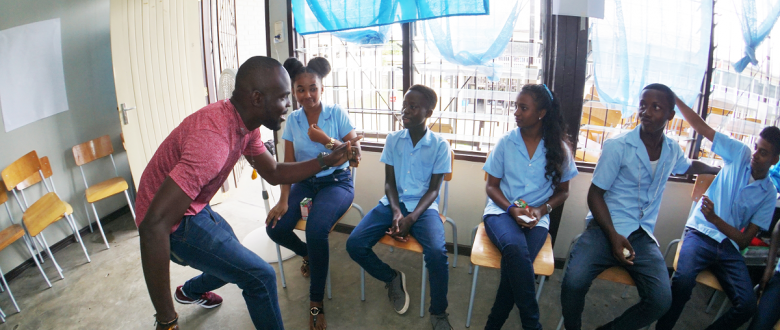
VVOB is equipping teachers and school leaders of Suriname’s lower secondary vocational schools with pedagogical tools to respond to inappropriate sexual behaviour with the help of Sensoa, the Flemish expertise centre for sexual health and member of the International Planned Parenthood Federation.
12+
Youth enrolled in Suriname’s lower secondary vocational (LBO) schools can be categorised as ‘vulnerable’. Coming from disadvantaged backgrounds, their risk of showcasing ‘problem behaviour’ at school is higher, which doesn’t bode well for their learning achievements, nor for their job perspectives later in life.
VVOB Suriname has been working with CENASU, the in-service teacher training centre in the country, to equip LBO teachers with the pedagogical skills to appropriately prevent and manage students’ problem behaviour.
Seeing the age of the LBO student population – 12 years and older – it doesn’t come as a surprise that a large proportion of the showcased problem behaviour is sexual in some way or another. VVOB Suriname and CENASU have therefore upgraded their training with a new component: how to address inappropriate sexual behaviour at school.
Dialogue
VVOB Suriname called in the support of Sensoa, the Flemish expertise centre for sexual health, in the development of this aspect of the training for LBO teachers and school leaders. Trainer Karen De Wilde trained the local VVOB staff, government officials, people from CENASU and other CSOs working on sexual rights in Suriname on Sensoa’s Flag System.
“Developing means learning, and learning means making mistakes”, Karen says. “When adolescents showcase problem behaviour, we can go into dialogue with them about any questions or needs they may have, and use that learning experience as an opportunity for them to grow.”
Green or red
The LBO schools determine in their school rules when certain behaviours are inappropriate on its grounds. When a situation reaches that point, the Flag System helps teachers and school leaders react accordingly by making them aware of 6 important aspects of sexual behaviour: consent, voluntariness, equality, age or development phase, context and self-respect.
After careful consideration of these criteria, a situation can raise a green (acceptable behaviour), yellow (slightly unacceptable behaviour), red (seriously unacceptable behaviour) or black (severely unacceptable behaviour) flag. Each flag points to a different appropriate response by the teacher or school leader, always putting the learning process of the involved student(s) at the heart.
Pedagogical responses
“The teachers will indeed learn how to apply the Flag System to specific situations of sexual behaviour, inappropriate or otherwise”, affirms Karen. “They’ll understand better how these behaviours fit into the overall development of their adolescent students.”
The key questions educators should ask themselves when confronted with such a sensitive question are: what does this behaviour say about the concerned student(s)? What should they learn from this incident, and how can we support them in that learning process? The answer to those questions informs the ways in which teachers can respond.
So, instead of banning all talk of sex and (in)appropriate conduct in schools, there will be a platform for open and healthy discussion. “One of the participants of my workshop, a school leader, told me at the end of the training that she would respond more pedagogically instead of repressively when confronted with a situation of sexual behaviour.”
The Flag System has proven an important part of the professional development of teachers and school leaders. Not only in their pedagogical approaches, but also in reflecting and re-examining their existing school rules, all the while being respectful of culture and school-related sensitivities.




